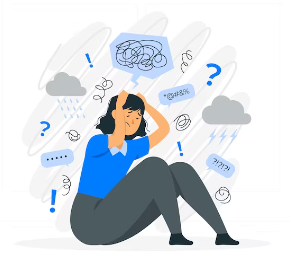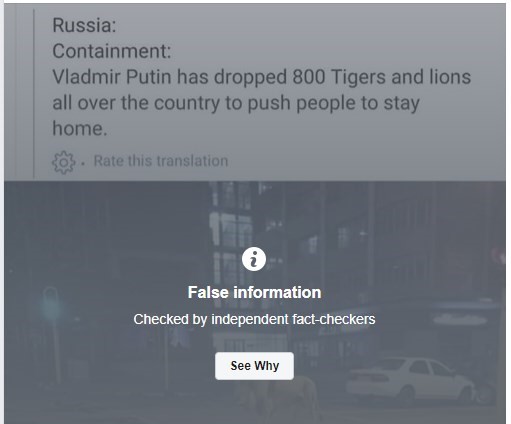
ព័ត៌មានមិនពិត ព័ត៌មានក្លែងក្លាយ និងការសើចចំអក
Like and Share


តើ Facebook ដឹងព័ត៌មានអ្វីខ្លះអំពីអ្នក?

ឯកជនភាពហ្វេសប៊ុក

Stay-safe-quiz
ទទួលព្រឹត្តិប័ត្រព័ត៌មានប្រចាំខែតាមអ៊ីមែល។ និងលក្ខណៈពិសេសជាច្រើនទៀតមិនត្រូវបានផ្សព្វផ្សាយនៅលើហ្វេសប៊ុកទេ
អត្ថបទបន្ទាប់រួមមាន
- ព័ត៌មានផ្ទាល់ខ្លួន និងឯកជន ហើយនិងរបៀបដែលអ្នកគួរផ្លាស់ប្តូរការកំណត់ផ្សេងៗរបស់អ្នក
- ការផ្សាយពាណិជ្ជកម្ម និងរបៀបដែលពួកគេប្រើប្រាស់ទិន្នន័យរបស់អ្នក
- តើហ្វេសប៊ុកចាត់ចែងទិន្នន័យរបស់វាយ៉ាងដូចម្តេច
- ភាពខុសគ្នារវាង ព័ត៌មានមិនពិត ព័ត៌មានក្លែងក្លាយ និងការសរសេបែបចំអក
- វាមានសារៈសំខាន់ណាស់ ហើយពិបាកវាយតម្លៃ
- ការប្រើប្រាស់បណ្តាញសង្គមជាវិជ្ជមានជាមួយមិត្តភក្តិ និងក្រុមផ្សេងៗ។ ការបែងចែករវាងមិត្តភក្តិអនឡាញ និងមិត្តភក្តិពិត
- ការចូលរួមតាមអនឡាញមានផលវិបាក និងមានមាតិកាបង្កជាការស្អប់ខ្ពើម
False information, Fake information and Satire
Understanding the differences can be difficult.
It can be just as difficult for adults as for young people.
False (also called misinformation)
False, incorrect information – but probably not with intent to mislead the reader
Fake (also called disinformation)
Fake, deliberately trying to mislead the reader
Satire – being humorous – expecting/hoping the reader to understand the joke.
Facebook and other social media say they remove Fake information. They try to distinguish it and remove it or let you know that it is false or fake.
It is not always easy to recognise False, Fake or Satire
Here is a good example
This from early 2020 when governments were trying to convince people to stay at home and not spread covid-19.

Facebook has identified it as false information – and put a grey cover over the story.
It is false because it is not accurate – but it really satire. A joke. The writer did not think people would possibly believe that President Putin would actually put tigers and lions around Russia.
Facebook can have difficulties distinguishing information.
Recognise the difference between false and fake.
How do you tell the difference between false and fake.
Not easy.
Here are some examples of false and fake information
False Information
In mid 2020, Donald Trump (then USA President) suggested on television that bleach would get rid of covid-19.
This was false, not fake. He was making a mistake (a bad mistake). He was not saying this to deliberately harm people.
Fake news was when he deliberately told people the election had been rigged and he had not lost. That was a deliberate lie to change things for his benefit.
Guidelines
How to spot Fake information
Be wary of headlines – Fake news will have catchy headlines
Investigate the source – search Google to see if the story is from other sources or just this one
Look at the photos carefully – have they been edited or changed
Check at the dates on the article
Look at the url – is it credible?
Question yourself
Is the story from a well know source (such as BBC, CNN, Reuters) or is it from a strange websiteCheck
Why do people create Fake news?
To mislead you, to do people harm (example – trying to persuade you not to have a covid-19 injection)
Click-bait – To make you re-act (anger / interest) so you visit their page, where they can get more re-action
Usually this earns them money from adverts on their website
Sometimes to gain more information about you (family, bank accounts) to become a “fake” friend
Because some people want to mislead other people for another benefit (fixing an election)
Examples
Misleading information
TB (tuberculosis). This disease had almost been eradicated from the world. Some people spread word the vaccine would harm you and you should not take it. Result: there are now more instances of TB than for many years.
Covid-19. In some countries (notably USA) campaigners try to persuade people not to have the vaccine. Result: they have more deaths than any other country.
Clickbait
Clickbait – is about getting you to click on a headline that takes you to their website,
- “10 tricks for a perfect skin (you wont believe #4)”
- “8 uses of oranges that you never thought of”
- “5 ways to get more minutes (for your phone) for free”
- Clickbait can also be misleading headlines
- “Lottery winner arrested for dumping $200,000 of manure on ex-boss’ lawn”*
*When this appeared, more than 2 million people clicked on the article.
What should you do if you see an article that does not seem real?
Don’t re-act
Question it (check the source, check google, check photos)
Don’t share it
What do Facebook do about it
… and other platforms – Instagram, Google, Twitter …
Action
They rely on people telling them about it
They use technology to find fake material.
If an article is found they use more technology to quickly find most of the shared content and remove it.
Consequences
If you create false or fake news Facebook may ban you or suspend you for a few weeks or months.
If you share false or fake news Facebook may ban you or suspend you for a few weeks or months.
First time someone does it, the ban may be short. If they do it multiple times they could be banned permanently.
Remember there are 3 Billion users of Facebook in the World (3,000 million)
There are 11 million users of Facebook in Cambodia
That is a huge amount of data to check 24/7
False and fake data will happen all the time
Be aware.
Remember the difference
False information, is incorrect but probably not trying to deceive you
Fake information, is deliberately trying to deceive you
Satire, is trying to be amusing about a subject (which may be false or fake information)
